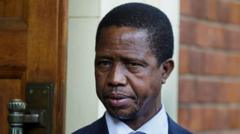Throughout his papacy, Francis was a staunch supporter of the impoverished and disenfranchised. Shortly after his election in 2013, he famously expressed a desire for “a church that is poor and for the poor.” His dedication to this cause was not merely rhetorical; it manifested in concrete actions. At his funeral, scheduled at the Basilica of Santa Maria Maggiore, the Vatican confirmed that a group of marginalized individuals would be present, underscoring his ongoing commitment to the welfare of the less fortunate. The ethos of his pastoral approach was inspired by St. Francis of Assisi, who renounced wealth to live a life of poverty among the needy.
One of the first mourners to visit his coffin at St. Peter's Basilica was Sister Geneviève Jeanningros, who dedicated her life to serving the vulnerable, reflecting Francis' focus on uplifting those who often go unnoticed. She had previously lived in a camper outside Rome, providing for the city's marginalized populations and shared a close connection with the pope.
In a significant initiative during his papacy, Francis advocated for transforming the Vatican post office into a free medical clinic, which opened its doors in 2018. This facility has provided essential healthcare services, averaging 100 daily visits, particularly to the homeless and undocumented migrants. Dr. Massimo Ralli, the clinic's director, emphasized that this initiative was deeply rooted in practicing the Gospel, highlighting the importance of charity and care for those in need.
As the world bids farewell to Pope Francis, his legacy serves as a powerful reminder of the impact one individual can have in championing the rights and dignity of the poorest. His life was a testament to faith put into action, leaving an indelible mark on the Catholic Church and society at large.
One of the first mourners to visit his coffin at St. Peter's Basilica was Sister Geneviève Jeanningros, who dedicated her life to serving the vulnerable, reflecting Francis' focus on uplifting those who often go unnoticed. She had previously lived in a camper outside Rome, providing for the city's marginalized populations and shared a close connection with the pope.
In a significant initiative during his papacy, Francis advocated for transforming the Vatican post office into a free medical clinic, which opened its doors in 2018. This facility has provided essential healthcare services, averaging 100 daily visits, particularly to the homeless and undocumented migrants. Dr. Massimo Ralli, the clinic's director, emphasized that this initiative was deeply rooted in practicing the Gospel, highlighting the importance of charity and care for those in need.
As the world bids farewell to Pope Francis, his legacy serves as a powerful reminder of the impact one individual can have in championing the rights and dignity of the poorest. His life was a testament to faith put into action, leaving an indelible mark on the Catholic Church and society at large.






















